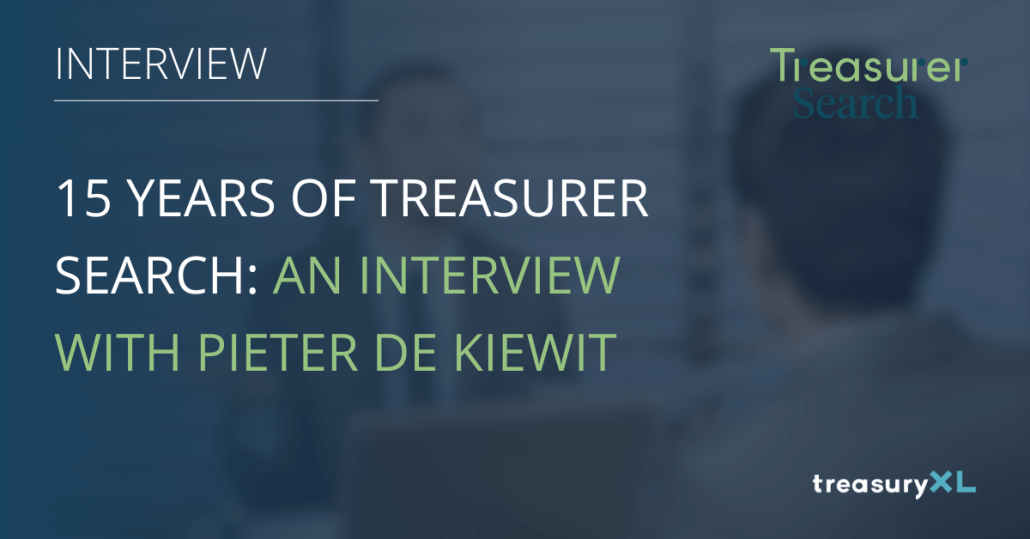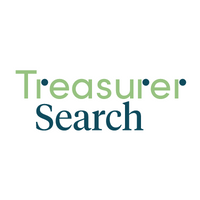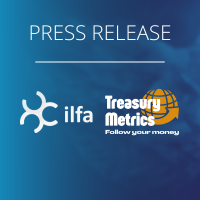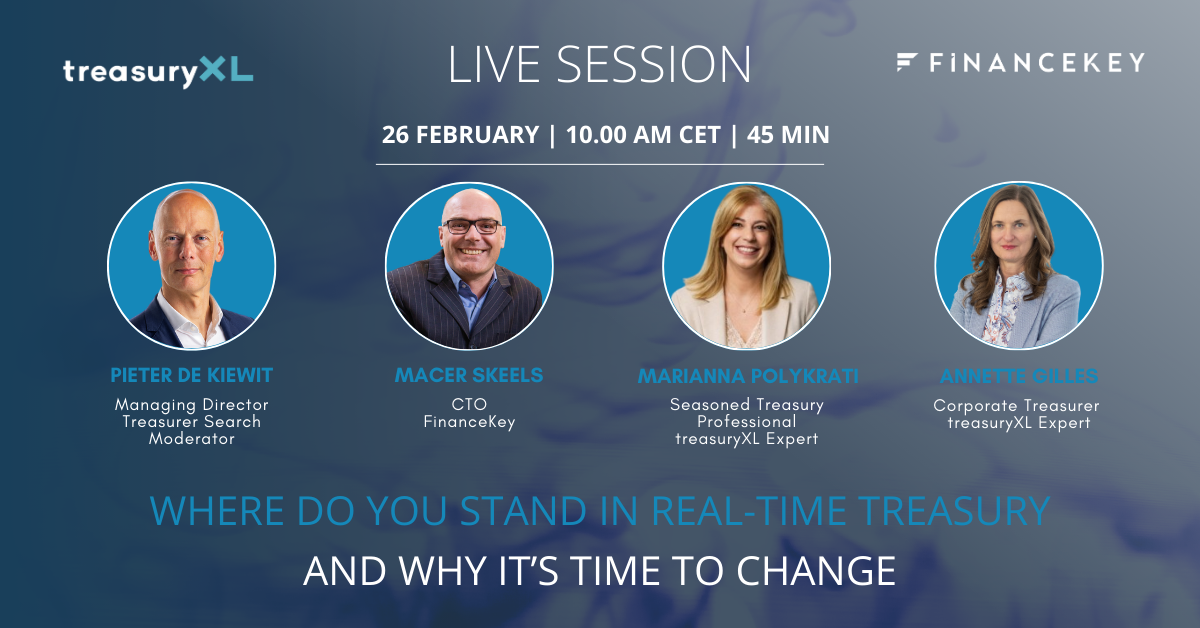The company has grown over the past years through a focus on what matters most: understanding the needs of the treasury field, building long-lasting relationships and maintaining a positive and engaging workplace environment. Read on to hear Pieter’s insights and reflections on the 15 years of Treasurer Search, what has happened in the meantime, and what you can expect for the future!
Reflecting on the past 15 years, what inspired you to start Treasurer Search, and how has that vision changed over time?
The inspiration behind Treasurer Search was personal rather than some grand vision. For me, it was about doing what I loved most in my working life—recruitment—and finding the right setup to do so. Being an entrepreneur wasn’t the primary goal; it was more about creating a company that allowed me to recruit in my own way.
Even before starting Treasurer Search, I veered back to any assignment that was treasury-related. So apparently, somewhere in my system, I liked the treasury component, and on that, I started to build the business case. What doesn’t go well with me is the bulk recruitment, the dime-a-dozen or commodity-type of recruitment, because I don’t think you can bring as much added value.
The niche approach worked for me because it allowed us to bring real expertise to both internal recruiters (telling them about treasury) and group treasurers (because they hardly ever recruit somebody, and we can tell them about the finesse of recruitment). These are some of the many aspects that blended well and led me to start Treasurer Search.
How has Treasurer Search evolved throughout the years?
From the start, our growth has been more organic. I never aimed for rapid expansion, but over time, growing the team has allowed us to do things we couldn’t have done with just three or four people. The essence of our approach hasn’t changed; we still aim to provide higher value.
I saw three stages over the years. At the start, we were 3 or 4 colleagues, working on the same assignments, all generalists. Then we went to a stage where we had two groups of generalists, a group of consultants heading assignments and next to that, support. Now we’re in the third stage with many specialists in support, like marketing and control and in parallel, also specialist on the consultancy side, in interim, seniority and certain geographies. Specializing is great, because I think, for instance, our screening and networking processes are better because we have much more expertise in-house.
What key values have guided you in building Treasurer Search, and how do they shape the way the company operates today?
Our core values come from my personal values and they are also a bit connected to me being Dutch perhaps, and having fun in an international environment. One of the values is always operating at eye-level, whether it’s with clients, candidates, or among ourselves. I do believe this is connected to building long-term relationships. The result of this is that you will do a better job as a recruitment company & employer, choose better candidates as well as help candidates build a career that is more thought through. The eye-level and the open and honest communication works best for me.
One of the great things of recruitment is how easy it is to measure if you are any good: you make the matches or you do not. Luckily, as a team, we prove that we can on a regular basis. And strongly connected to this is quality of services. We do want clients and candidates to return and hate a sloppy job. It makes me proud when clients return to us and ask us to find further employees.
But also enjoy working together. Primary goal is, of course, not fun, but without it, it becomes more difficult to enjoy what you do. So for me, these are some of the aspects I started off with and I think in the market nowadays, they are even more important. We see that the market is tilting, where the power of the candidates is going up because of staff shortage.
Looking back over the past 15 years, what do you consider to be Treasurer Search’s greatest achievements?
That’s a tough one because there are so many different flavors of achievements. From a business buildup, moments like when a company for the first time spontaneously called us with an assignment, or when we placed our first group treasurer at a listed firm, are all significant milestones. Building full treasury teams is also a great fun.
We celebrated 15 years and one contemplates, and you realize there is an office with people who have kids at home, who are paying mortgages, who are building their lives, who have fun and the fact that their bills are being paid based on what we established. That is rewarding.
Is there anything you would have done differently, or any lessons you’ve learned that you’d like to share?
Of course, mistakes are made and we are not God’s gift to recruitment. Nobody’s perfect here. I think learning is connected to the goals you have. If the goal were to make most money or to only fill senior assignments, then we would have done things differently.
Looking back, I think a bit less organic and more fact-oriented could have prevented some mistakes, investments that did not bring revenue, or could have increased speed in desired developments, but I also think they’re part of the learning process. There’s nothing that I would do differently unless hindsight is 20/20.
Can you explain your approach to networking and relationship-building within the treasury community?
I think it’s a mixture of various things. First off, as a team of 15, we try to balance our personal approaches with the company’s strategy. The same eye-level aspect I mentioned earlier applies here, whether it’s with candidates, clients or colleagues. At the same time, it’s also a personal approach. Colleagues here in the team should feel well about how they communicate with the outside world. I think from communicating with candidates and clients, there’s also a balance between bringing relevant content and relationship management.
For us, it’s about the continuous contact in a frequency that feels good for all involved. A blend of personal meetings, calls, emails, we do quite a bit in modern marketing, and lately we’ve seen a lot of success also with on-line and live events. I try not to overly structure the process, because then it becomes inauthentic. That’s a bit about relationship building and the Treasury community.
How do you balance the needs of the client with those of the candidates?
Be open, transparent and honest. Don’t tell stuff about candidates that the candidates didn’t say themselves and the other way around. And keep the long-term relationship in mind, so no quick wins. If you cut corners, if you upsell a job to a candidate and things go wrong, it will bite you in the tail in future cooperation. So be open, and transparent and that’s been the case from the start for us.
However, as I mentioned before, the world is catching up with us, transparency is no longer a plus, but a necessity. Be open , tell clients, “Okay, you pay the bill, but I cannot treat candidates unethically for that reason.” and you cannot be the slave of a candidate who has an excellent CV. So the eye-level approach remains essential.
What are your future visions for Treasurer Search?
We should be more rational and analytical about what we achieve and what works and doesn’t, but the company values will remain. What I hope to achieve together is that we can grow and have a stable company without depending on one or a few members. Be a company that can live through happy and tough times. I expect that there will be growth in the German-speaking area shortly and I can also imagine that we grow into other geographies depending on the people who come in. It remains a people business.
What we most definitely will not do is branch out into other service types. The core basis will remain recruitment for permanent and interim positions. You will not see us offering paid career coaching, treasury consultancy, educational services or whatsoever. What you can expect from us is that we keep investing in our core skills, on the one hand Treasury, on the other in recruitment. Both fields are in a continuous development and have been changing. That keeps us on our toes and enjoy our position.














